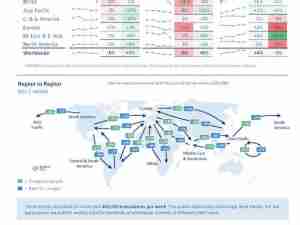
Good news in the airline industry is hard to come by these days, but British Airways World Cargo (BAWC) was so delighted with its year end financials that it hosted a group of journalists from around the world in early May to Turnberry, Scotland to reveal the details. Those figures showed that BAWC's year-end flown revenues totaled '482.1 million or approximately $868 million for 2004/2005, 4.1% ahead of those reported in 2003/2004. When the effect of the exchange rate is removed, BAWC executives point out this figure increases to 11.8%.
To celebrate, the group enjoyed a good meal and after dinner whiskey in the famous golf resort's Whiskey Bar.
"These are certainly good results in a difficult market," said Gaerth Kirkwood, BAWC managing director, during the press briefing. For the year, BAWC realized a turnover of '7.813 million for an increase of 3.3% with an operating profit of '540 million and '6.9 million operating margin.
"Fuel remains a critical issue for the airlines," Kirkwood pointed out. Between December 2003 and March 2005 BAWC saw fuel costs rise 89 percent. "We forecast next year our fuel bill will be '400 million higher," he stated. "There is no way passenger and cargo surcharges come near to covering these costs."
Geographic positioning
Helping the airline has been its geographic position around the globe, despite poor performance in Europe.
"A big drain has been our lack of profits in Europe," Kirkwood said. "But we are now at break even there. A major factor has been the turnaround of British Airways' passenger business. The carrier's biggest competition has been Europe's low cost carriers Easy Jet and Ryan Air. We have been copying their business model, and as a result, have improved profitability."
The Americas have shown healthy profits over the last five years with the rest of the world also gaining.
BAWC is recovering from debt. In 2001/2002 net debt stood at '6.6 billion, whereas in 2004/2005 it was at '3.7 billion.
"The reason for the high figure in 2001/2002 was large investments in Boeing 777 aircraft and orders from Airbus for short haul flights," Kirkwood said. He added, however, that the debt will most likely increase since the airline will be investing in its fleet again in the near future.
"Pension liabilities will also increase debt," he stated. "This will be the result in changes in accounting rules."
Yet, overall BAWC shows consistent improvement with a 10% margin from its minus 1.3% in 2002 to 6.9% in 2005.
Capacity issues
Steven Gunning, head of finance, BAWC, pointed to other financial details, including the fact that capacity is up 4.6% for this year.
"The load factor is up 3.6 points," he added.
Yet, yields were down 6.2% due primarily to pricing. "Prices continue to fall due to competition," he stated.
Helping BAWC's performance for the year was added capacity.
"We have driven performance by adding capacity with the introduction of a fourth freighter in September 2004 and a third Seoul rotation," he said. "We also realized the full year benefits of capacity added in 2003/2004. This includes a third long haul freighter in our European Freighter program." BAWC also added six new destinations: Shanghai (SHA); Kuwait City (KWI); Lusaka, Zambia (LUN); Chicago O'Hare (ORD); Haifa, Israel (HHN); and Milan, Italy (MXP).
Gunning pointed out that since British Airways began offering service to Shanghai, that route now encompasses 20 percent of BAWC's volume.
"By growing volumes through close partnerships with our customers, we have also increased our load factor and supported yield," he said.
At 43%, the Asia Pacific encompasses the largest portion of BAWC's revenues. For 2004/2005, this route represents a 25% increase over last year's revenues, the result of increased capacity to India, Korea, China, and Hong Kong. During 2005, BAWC will also






